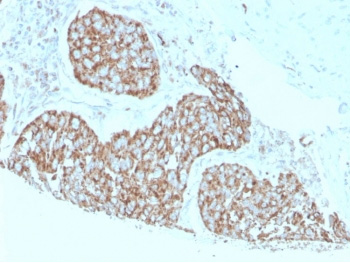- Tel: 858.663.9055
 Email: info@nsjbio.com
Email: info@nsjbio.com
- Tel: 858.663.9055
- Email: info@nsjbio.com
Macrophage Marker Antibody detects proteins expressed in macrophages, versatile immune cells derived from monocytes that migrate into tissues and differentiate in response to environmental cues. Macrophages are distributed throughout virtually all organs, where they perform phagocytosis, cytokine release, tissue repair, and immune regulation.
Markers commonly recognized by Macrophage Marker Antibodies include CD68, CD163, CD11b, F4/80 (in mice), and HLA-DR. CD68 is a lysosomal glycoprotein widely used to label macrophages in histology. CD163 is associated with anti-inflammatory, tissue-repairing macrophages, while HLA-DR highlights antigen presentation. The Macrophage Marker Antibody is therefore indispensable for identifying macrophages, studying their phenotypes, and clarifying their contributions to immunity and pathology.
Because macrophages exhibit remarkable plasticity, switching between pro-inflammatory (M1) and anti-inflammatory (M2) states, Macrophage Marker Antibodies are widely applied in immunology, oncology, cardiovascular research, and regenerative medicine.
NSJ Bioreagents provides Macrophage Marker Antibodies validated for immunohistochemistry, immunofluorescence, flow cytometry, western blotting, and ELISA. Each Macrophage Marker Antibody undergoes rigorous quality control to ensure specificity to macrophage proteins while minimizing cross-reactivity with related immune cells.
By choosing a Macrophage Marker Antibody from NSJ Bioreagents, researchers gain reagents optimized for reproducibility. Our antibodies provide sharp staining in tissue sections, strong signals in protein assays, and consistent performance in flow cytometry. With comprehensive datasheets, recommended controls, and technical guidance, NSJ Bioreagents ensures that Macrophage Marker Antibodies deliver high-quality, reproducible results across diverse experimental platforms.
The Macrophage Marker Antibody has broad applications due to the central roles macrophages play in health and disease.
Macrophage Marker Antibodies detect phagocytic activity during bacterial and fungal infections.
The Macrophage Marker Antibody highlights macrophage cytokine production that shapes adaptive immune responses.
Researchers use Macrophage Marker Antibodies to clarify macrophage–T cell interactions in immunity.
Macrophage Marker Antibodies distinguish pro-inflammatory M1 macrophages from tissue-repairing M2 macrophages.
The Macrophage Marker Antibody is applied in models of rheumatoid arthritis, lupus, and inflammatory bowel disease.
Researchers use Macrophage Marker Antibodies to monitor macrophage-driven pathology in multiple sclerosis.
Tumor-associated macrophages (TAMs) are identified using Macrophage Marker Antibodies.
The Macrophage Marker Antibody helps evaluate TAM roles in angiogenesis, invasion, and metastasis.
Researchers apply Macrophage Marker Antibodies to assess TAM biomarkers predicting immunotherapy outcomes.
Macrophage Marker Antibodies are used to study atherosclerotic plaque macrophages.
The Macrophage Marker Antibody supports obesity and diabetes research by tracking adipose tissue macrophages.
Researchers apply Macrophage Marker Antibodies to ischemia-reperfusion injury models.
Macrophage Marker Antibodies reveal macrophage involvement in wound healing and fibrosis.
The Macrophage Marker Antibody is applied in stem cell research to study immune modulation during graft integration.
Researchers use Macrophage Marker Antibodies to explore macrophage-driven tissue remodeling.
Macrophage Marker Antibodies track macrophage reservoirs of pathogens such as HIV and Mycobacterium tuberculosis.
The Macrophage Marker Antibody supports research into macrophage contributions to antiviral defense.
Macrophage Marker Antibodies validate drug effects on macrophage polarization.
The Macrophage Marker Antibody is used in biomarker discovery for chronic inflammatory diseases.
Researchers employ Macrophage Marker Antibodies in clinical trials testing macrophage-targeted therapies.
Macrophages act as immune sentinels and regulators, influencing inflammation, repair, and disease progression. The Macrophage Marker Antibody provides precise detection of these cells, while Macrophage Marker Antibodies more broadly empower research across immunology, oncology, cardiology, and regenerative medicine.
In basic biology, Macrophage Marker Antibodies illuminate macrophage diversity and plasticity. In autoimmunity, the Macrophage Marker Antibody highlights inappropriate activation that drives tissue damage. In oncology, Macrophage Marker Antibodies clarify the tumor-supporting and tumor-suppressing roles of TAMs.
Clinically, macrophage markers are being explored as diagnostic and prognostic biomarkers for cancer, cardiovascular disease, and chronic inflammatory conditions. By providing reliable detection, the Macrophage Marker Antibody connects molecular biology to patient outcomes, advancing both discovery science and translational medicine.
Macrophages are dynamic immune cells critical for defense, repair, and disease modulation. The Macrophage Marker Antibody equips researchers with a dependable tool to detect and analyze macrophages, while Macrophage Marker Antibodies more broadly support advances in immunology, oncology, metabolic disease, and regenerative medicine. By linking cellular mechanisms to therapeutic applications, these antibodies remain vital for biomedical discovery and clinical innovation.

IHC staining of FFPE human breast cancer tissue with S100A9 antibody (clone S100A9/1075). S100A9 is expressed by macrophages in acutely inflamed tissues and in chronic inflammation.